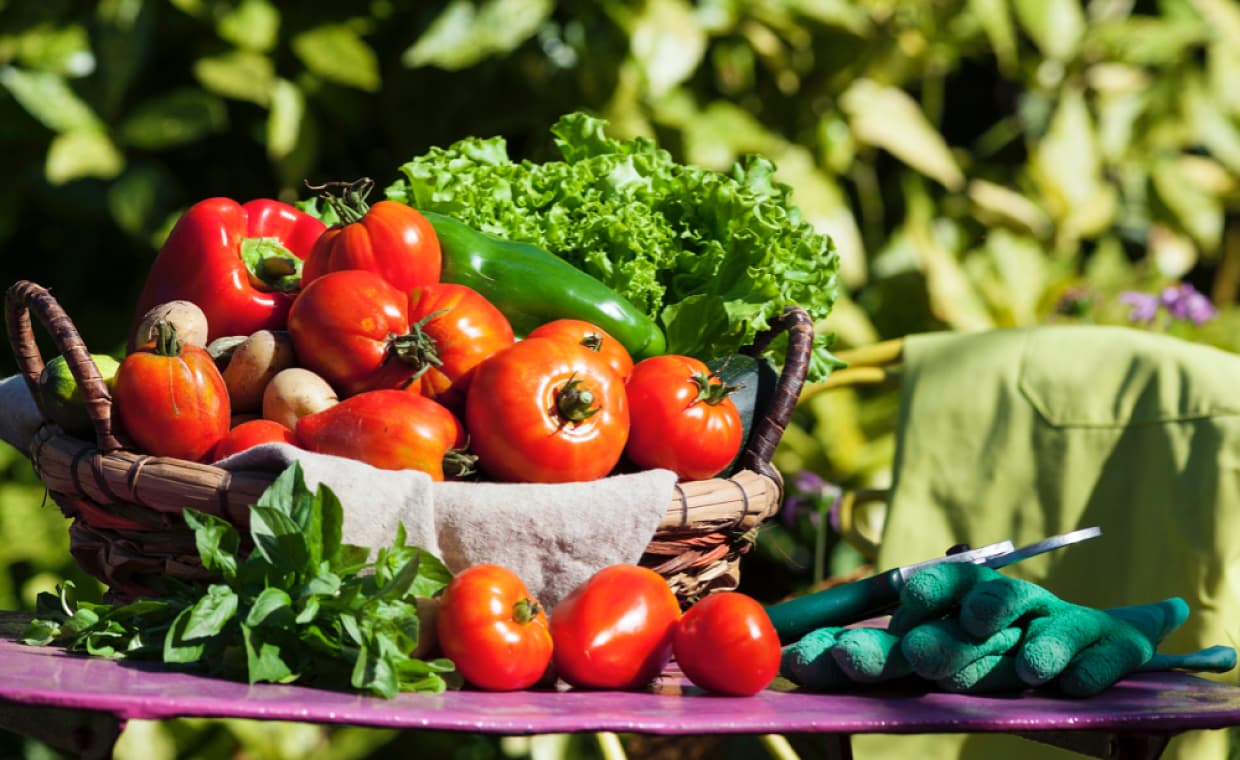
Table of Contents
Quick Summary
- An organic kitchen garden at home can be set up on a balcony, terrace, or in the front or back yard.
- Not all gardens are truly organic; certified practices are key.
- Organic produce must be free from chemicals, GMOs, and artificial additives.
- Certification is a must for a product to be labelled “organic.”
- Good sunlight, soil, water, and organic seeds are essential for starting an organic garden.
- Use natural fertilisers like compost, cow dung manure, and bone meal.
- Avoid chemical pest control. Instead, you can apply neem oil, garlic spray, or companion planting.
- Water plants at the base early in the morning, and avoid overwatering.
- Easy-to-grow vegetables include tomatoes, spinach, mint, carrots, and chillies.
- An organic garden offers fresh food, better air, and cost savings.
- Besides organic yields, the garden promotes a sustainable lifestyle, reduces waste, and encourages recycling.
- With consistent care, an organic kitchen garden will flourish year-round.
Organic kitchen gardening is now a trending concept as people are now aware of the harmful effects of toxic pesticides and hormonal boosters in food. Whether you live in an apartment with a small terrace or balcony, or a house with a front or backyard, you can create your own organic kitchen garden with a little effort.
However, not all kitchen gardens are organic in the true sense. Organic gardening is not a self-proclaimed label. It’s not just about the quality of the produce, but it is also about the methods of cultivation. A truly organic garden has no chemical usage whatsoever.
The Criteria to Call a Garden Product Organic
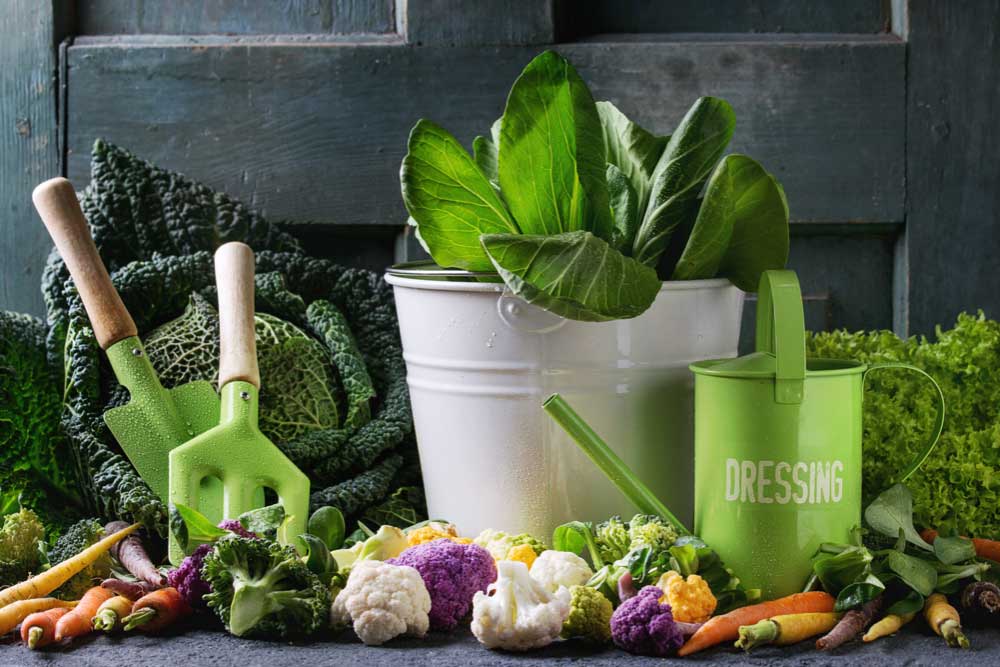
An organic product should meet specific standards at every stage of production, handling, and labelling. National or international certification bodies have predefined all these criteria. Below are the general requirements:
- No Synthetic Chemicals
- Must not be grown or processed with synthetic fertilisers, pesticides, herbicides, or fungicides.
- Only natural substances are allowed.
- Non-GMO (Genetically Modified Organisms)
- The product must not contain genetically modified ingredients.
- Seeds and inputs must be from natural or organic sources.
- Organic Farming Practices
- Maintain soil fertility through composting, crop rotation, and natural methods.
- No chemical soil treatments are allowed.
- Strict use of natural pest and disease control methods.
- No Artificial Additives
- Processed organic foods must not contain artificial preservatives, colours, or flavours.
- Emulsifiers, thickeners, and other additives must be naturally derived or approved under organic standards.
- Certified Organic Inputs
- Seeds, feed, soil conditioners, and even water sources must meet organic criteria.
- Any substance used must be approved by the certifying body.
- Clean and Separate Handling
- Organic products must be processed, stored, and transported separately from non-organic ones.
- Use clean, contamination-free equipment.
- Certification by an Authorised Organic Certifier
- An accredited organic certification agency must certify the product.
- In India, this could be NPOP (National Programme for Organic Production) or PGS-India.
- Internationally: USDA Organic, EU Organic, or similar.
- Clear Labelling
- The label must mention the certifying body and the percentage of organic content.
- If a product is not 100% organic, it must disclose the proportion of organic ingredients.
- Sustainable and Eco-Friendly
- The production process must minimise harm to the environment.
- Emphasis on renewable resources, reducing carbon footprint, and water conservation.
A product can only be officially labelled “organic” if it meets all these standards under a recognised organic certification system.
10 Basic Steps of Setting an Organic Garden?
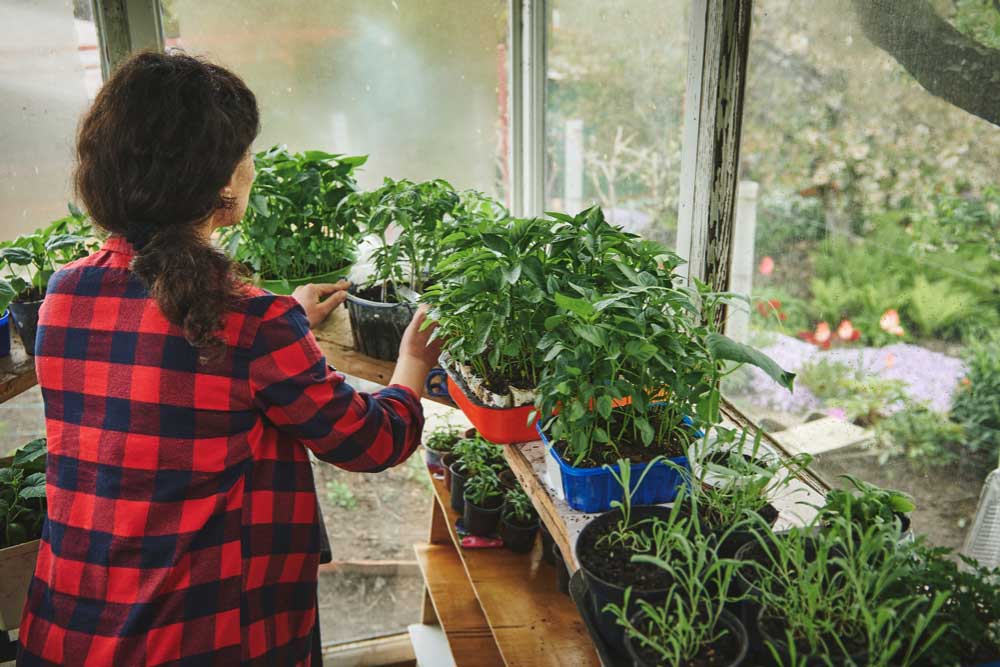
If you are inspired by the organic concept and ready to walk extra miles to set up an organic garden, follow these basic rules:
- Select a spot that receives direct natural sunlight for at least 5-6 hours a day.
- Choose a well-ventilated space like a balcony, terrace, or backyard. If space is an issue, you can create a mini organic kitchen garden on your window ledge.
- The kitchen garden soil should be rich, loose, and well-draining. Avoid chemical additives or fertilisers to boost its fertility.
- Ensure a steady supply of clean water. Watering should be based on the plant’s needs.
- Ensure good drainage in soil containers to prevent root decay in vegetable plants.
- Use only certified organic seeds, free from chemicals or genetic modification.
- Apply natural, chemical-free fertilisers like compost, dry leaves, or cow dung instead of synthetic options.
- Focus on natural pest control. Instead of chemical pesticides, consider using natural options like neem oil or garlic water.
- Pick containers or raised beds according to your available space and the number of plants you plan to grow. For balconies and terraces, container gardening is the most viable option
- Plant seasonal vegetables or herbs suitable for the local climate for better results.
By following these basics, you can set up and maintain a healthy, chemical-free garden that thrives with both yield and green beauty.
Practical Tips for Your Organic Kitchen Garden
Setting up an organic garden is relatively simple if you follow the right steps. However, keeping it thriving for years can be more challenging. So, what are the common problems seen in organic gardens? Here is a list:
- Yellow leaves? It might be due to overwatering or nutrient deficiency.
- Too many bugs? You may try neem oil or companion planting.
- Slow growth? Check whether the garden is getting enough sunlight and nutrients.
With consistent care and a few mindful practices, you can overcome most challenges and keep your organic kitchen garden flourishing.
1. Take Care of the Soil
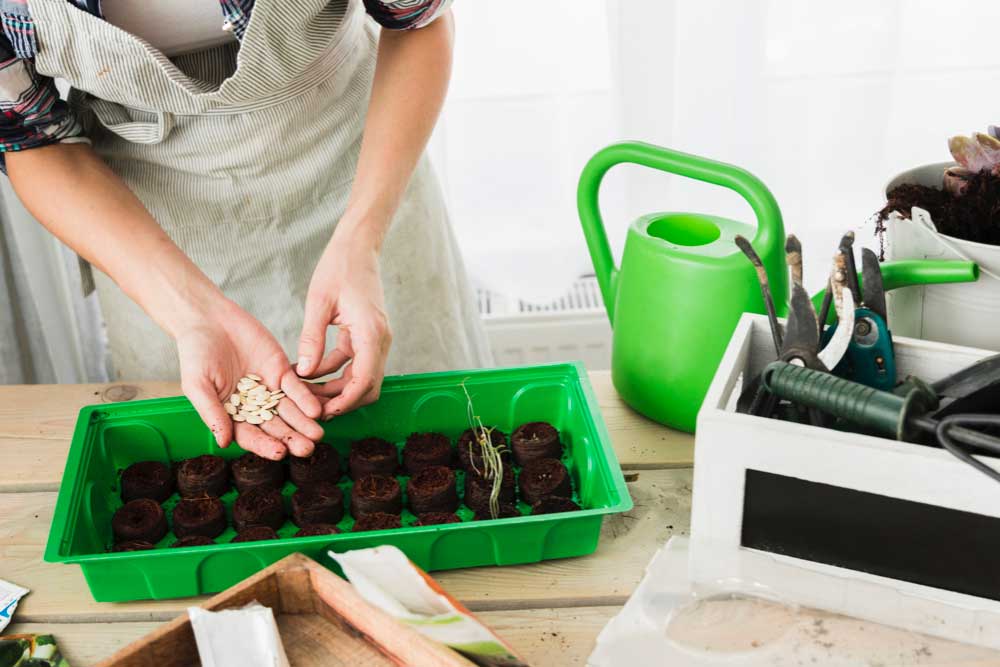
The soil in your organic kitchen garden is your asset. It is the foundation for growing healthy produce, especially because chemical growth boosters are off your racks. You should prepare it with care and maintain its quality.
Never allow the soil to become soggy from overwatering. Keep it loose with careful mulching so that the plant roots receive enough oxygen.
Add natural fertiliser from time to time to maintain the soil’s fertility at its best.
2. Pest Control is a Needed Prevention
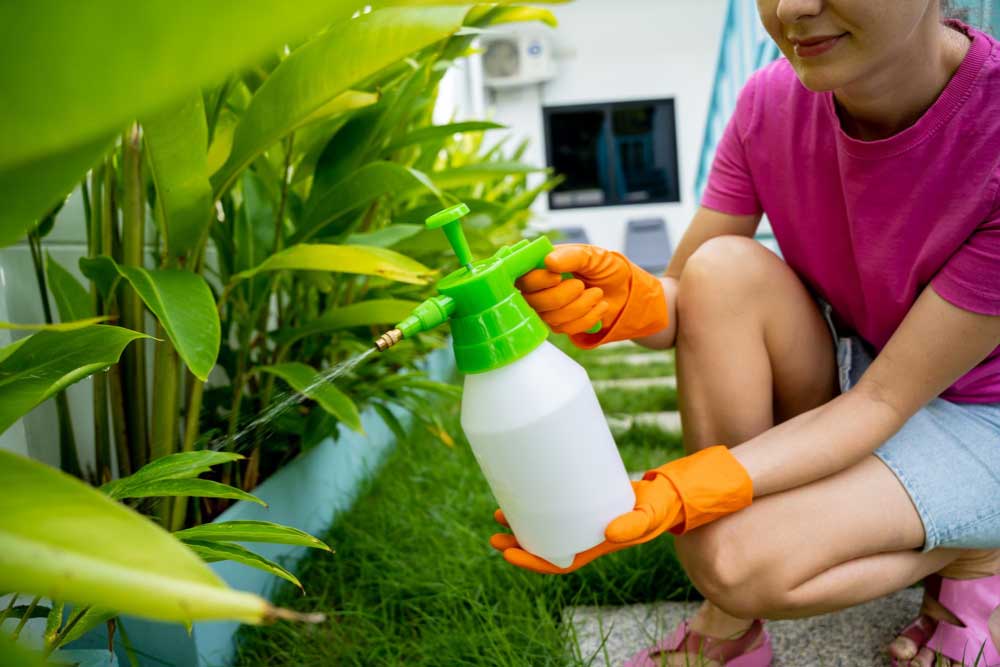
Pests are the pesky, unwanted intruders in a garden, and in a kitchen garden, they can spoil your vegetables mercilessly. But as a rule of an organic kitchen garden, you cannot use any chemical pesticides to eliminate them. If that is the case, what are the natural, toxin-free organic pest control methods to get rid of them? Let’s learn.
- Use neem oil spray to repel common pests like aphids and whiteflies.
- Attract beneficial insects like ladybugs and lacewings to naturally control pest population.
- Companion planting (like marigolds with tomatoes) helps deter harmful bugs.
- Apply garlic or chilli-based sprays as natural insect repellents.
- Keep your garden clean by regularly removing dead leaves and weeds to curtail the pests’ breeding grounds.
- Encourage small birds to visit your garden as they eat insects and keep your organic garden pest-free.
- Use diatomaceous earth around plants to stop crawling insects as one of the organic pest control methods.
3. Proper Watering Technique
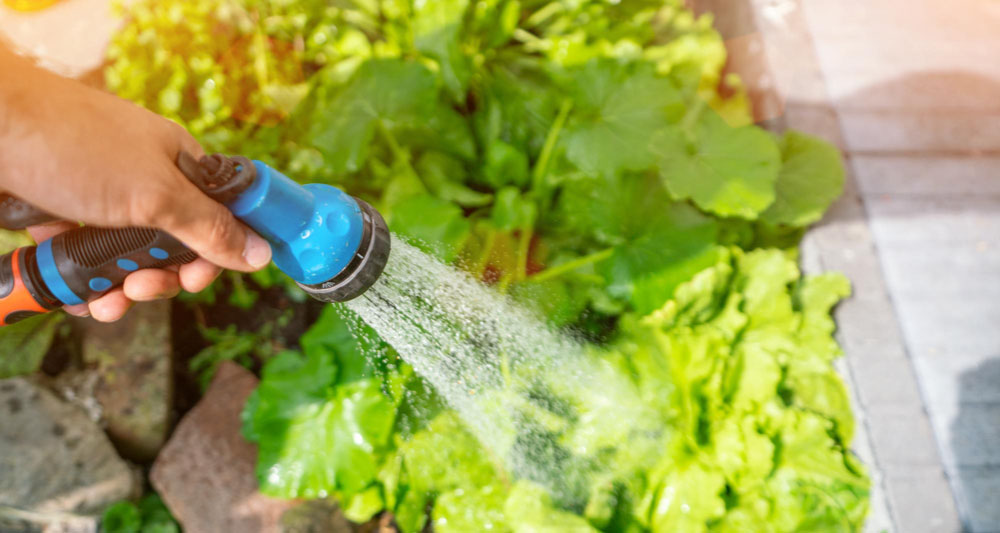
Water is one of the lifelines of your organic kitchen garden. But improper watering can stunt the growth and even cause plant decay. Follow these tips to water your organic garden for outstanding results.
- Water early in the morning to reduce evaporation and prevent fungal growth.
- Always water at the base of the plant, not on the leaves.
- Use a watering can or drip system for better control.
- Check soil moisture by touching it; only water when the top inch feels dry.
- Deep watering once or twice a week is better than light watering every day. However, in summer, daily watering may be necessary.
- Overwatering can lead to root decay, so avoid it.
- Mulch the soil frequently to help retain moisture and reduce the need for frequent watering.
- Water more during dry periods, and reduce or stop watering during rainy seasons.
4. Best Fertilisers for Organic Kitchen Garden
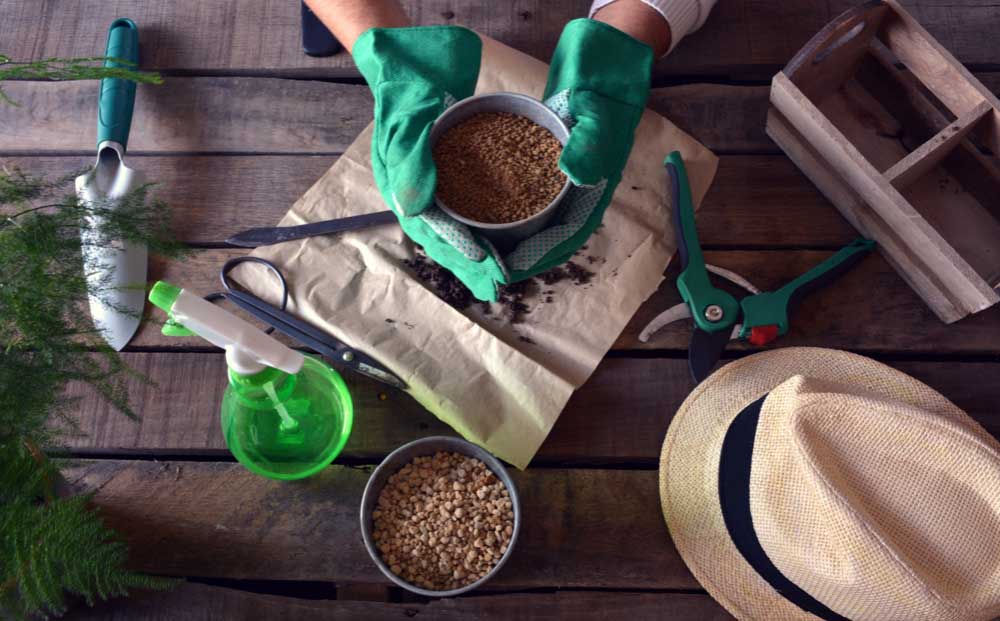
The ideal fertilisers for an organic kitchen garden are always chemical-free. Using natural products is a core rule of organic gardening. Here are some natural and chemical-free options of organic fertilisers for maintaining your organic garden.
- Compost – Made from kitchen scraps and garden waste, it improves soil texture and adds essential nutrients. Composting at home promotes recycling too.
- Vermicompost – Produced by earthworms, it is rich in nutrients and boosts soil health.
- Cow Dung Manure – A traditional, natural fertiliser, this improves soil fertility and supports microbial life.
- Bone Meal – Works as both a natural pesticide and fertiliser; improves soil and repels pests.
- Fish Emulsion – A liquid fertiliser that is fast-acting and rich in nitrogen.
- Green Manure – Plants like mustard or clover are ploughed back into the soil to add organic matter.
- Banana Peel Fertiliser – High in potassium and phosphorus, it supports overall growth.
Easy-to-Grow Vegetables in Your Kitchen Garden
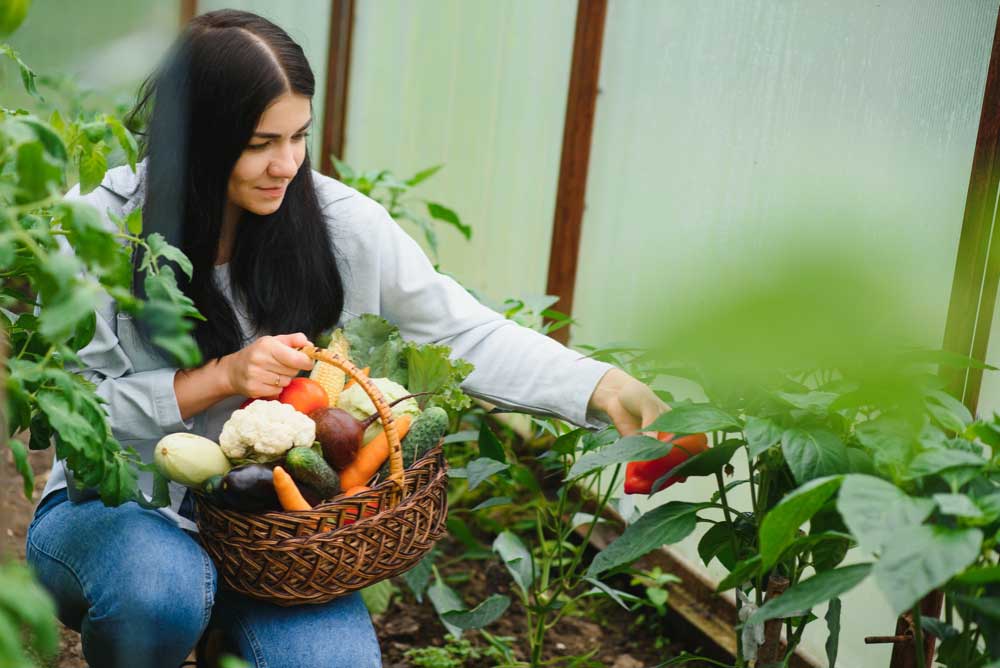
Not all vegetables are suitable for a kitchen garden. Whether you’re a beginner or an experienced gardener in vegetable gardening in home, the following vegetables grow easily with minimal to moderate care.
- Tomatoes – Need 5-6 hours of sunlight and moderate, regular watering. They grow well in pots.
- Spinach – This fast-growing leafy green is prone to pests; neem oil spray keeps them healthy. You can grow them in partial shade.
- Radish – Quick to harvest and grows well in shallow containers.
- Coriander – Easily grown from seeds in loose, moist soil.
- Chillies – Low-maintenance plants that require direct sunlight and moderate watering.
- Lettuce – Fast-growing leafy greens thrive in cooler weather.
- Mint – A fragrant and flavourful medicinal herb that grows well in containers and repels pests.
- Fenugreek (Methi) – It is another easy-to-grow medicinal herb from seeds. You can use a single harvest for repeated yields.
- Beans – Grow as climbing or bushy plants in direct sunlight. The climbing variety requires support.
- Carrots – Need loose soil and full sun exposure to develop healthy roots.
The Benefits of Maintaining an Organic Kitchen Garden at Home

There are multiple benefits of maintaining an organic kitchen garden at home. Let’s take a look at the key advantages.
- Fresh produce – You can enjoy pure, natural and fresh vegetables straight from your garden.
- Chemical-free food – No harmful pesticides or fertilisers used.
- Cost-effective – Reduces grocery bills over time.
- Healthy lifestyle – Encourages better eating habits.
- Stress Relief – Gardening as a hobby helps reduce stress and nurtures your creativity.
- Better Air Quality – Plants improve indoor air and reduce pollution.
- Recycled Waste – Kitchen scraps become compost, supporting recycling and a sustainable lifestyle.
- Family Bonding – A kitchen garden brings family members together through shared activities and quality time.
Final Thoughts
An organic kitchen garden is not just a source of fresh vegetables; it is much more than that. Besides helping in budget planning, it supports healthy living, promotes sustainable practices and brings you closer to nature.
With some care, you can grow clean and 100% organic vegetables in your front yard, backyard or even on a small balcony. Start with a few hardy plants, stay consistent with your gardening routine, and enjoy the satisfaction of watching your home-grown produce thrive.
Also Read: Tips to Maintain Your Kitchen Garden This Season!
FAQs on Tips to Start Organic Kitchen Garden
1. Which Factor Is the Most Important for the Success of an Organic Kitchen Garden at Home?
An organic kitchen garden needs a location with abundant natural resources such as sunlight, good soil, a safe distance from shrubs and trees, and proximity to a water source. It cannot grow in a shady spot or without proper watering. Therefore, ensuring the availability of all these basic factors is a must for the success of an organic kitchen garden.
2. What Is the Primary Purpose of an Organic Kitchen Garden at Home?
The primary objective of setting up an organic kitchen garden at home is to provide fresh, green, naturally produced, chemical and toxin-free vegetables. Another benefit is the joy of engaging in a creative and fulfilling activity. Additionally, it helps improve the air quality of your premises naturally.
3. Is Organic Garden Soil Better?
Organic soil is made by adding organic materials to the existing soil. These organic materials improve the ability of sandy soils to hold nutrients and water. In clay soil, organic additions enhance drainage and aeration. They also help retain moisture, making the soil more breathable and supportive for the plants’ growth.
References
Rajeev Pratap Singh (2012) in Organic Fertilizers: Types, Production and Environmental Impact in Publisher: Nova Science Inc., New York. Editor: Rajeev Pratap SinghISBN: 978-1-62081-422-2 [Online] Available from https://www.researchgate.net/publication/274896698_Organic_Fertilizers_Types_Production_and_Environmental_Impact
J.E. Parker, William E. Snyder, G.C. Hamilton, Cesar Rodriguez-Saona (2013) in Companion planting and insect pest control, http://dx.doi.org/10.5772/55044 [Online] Available From https://www.researchgate.net/publication/285189207_Companion_planting_and_insect_pest_control






























